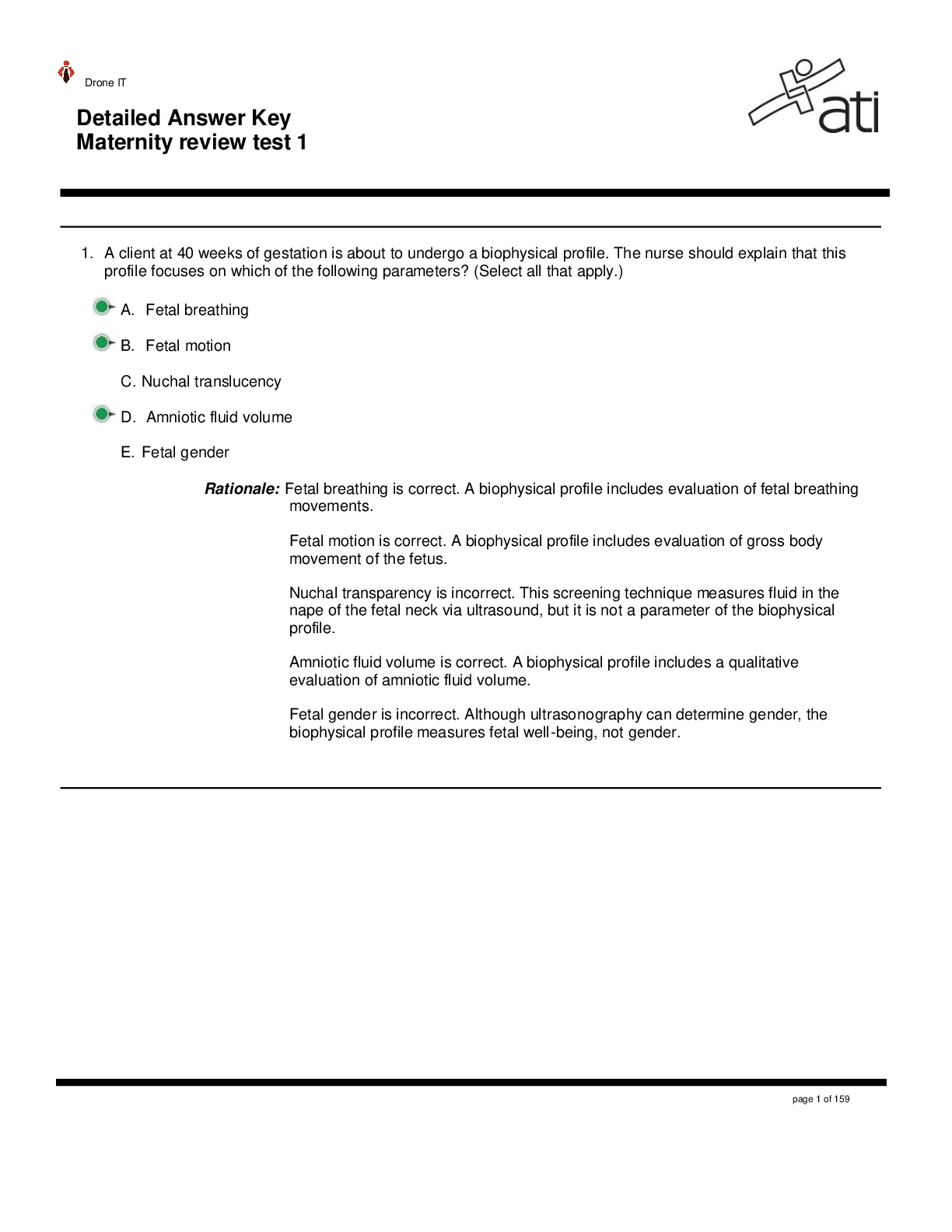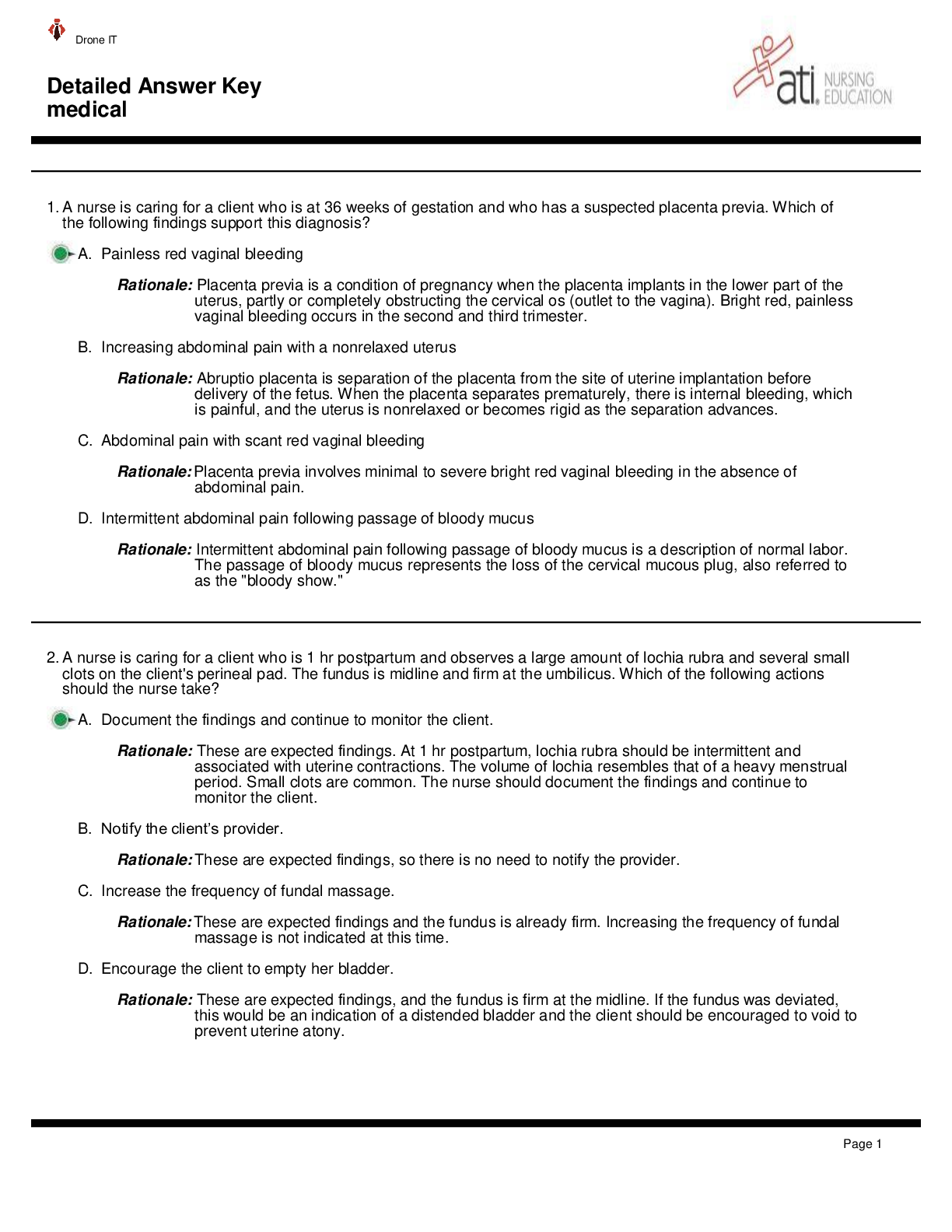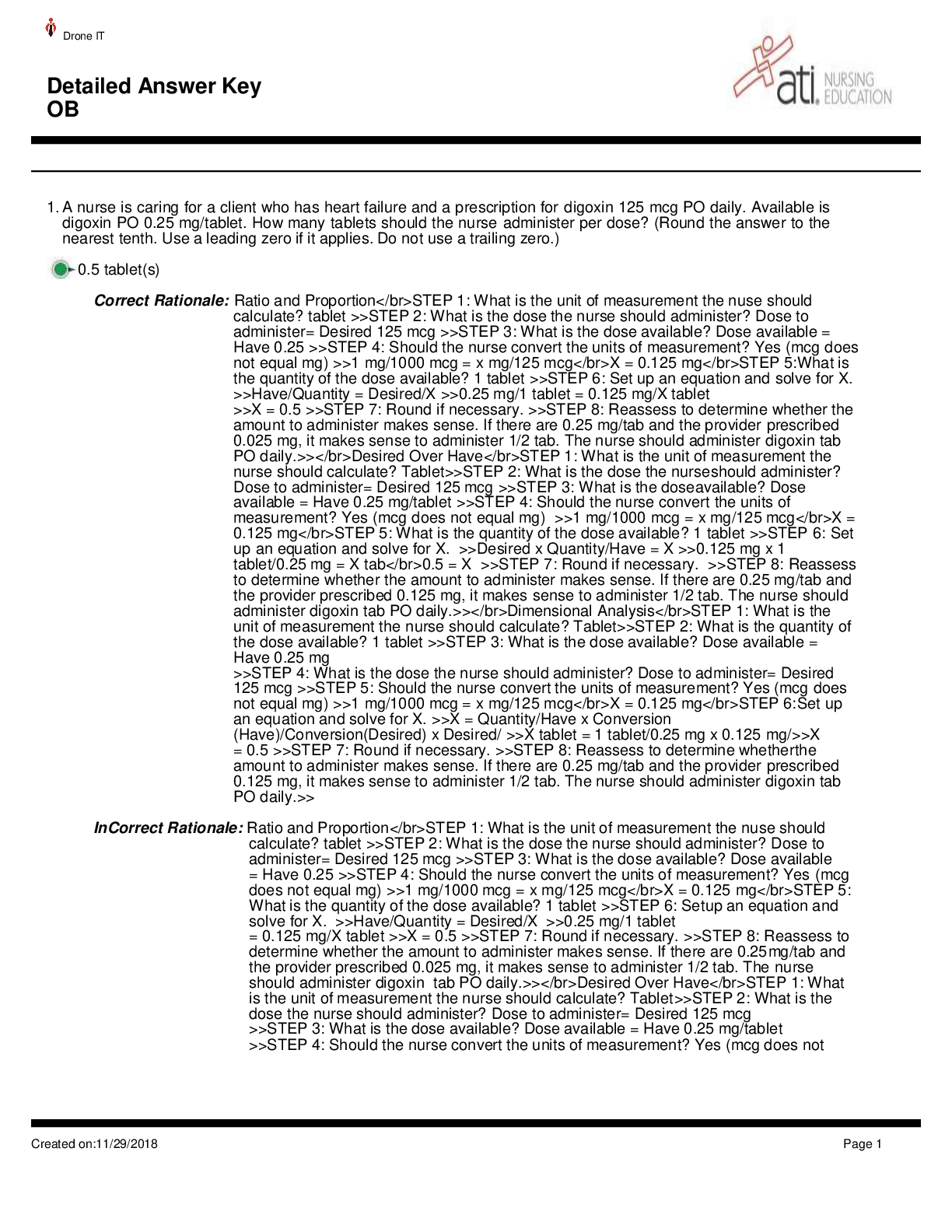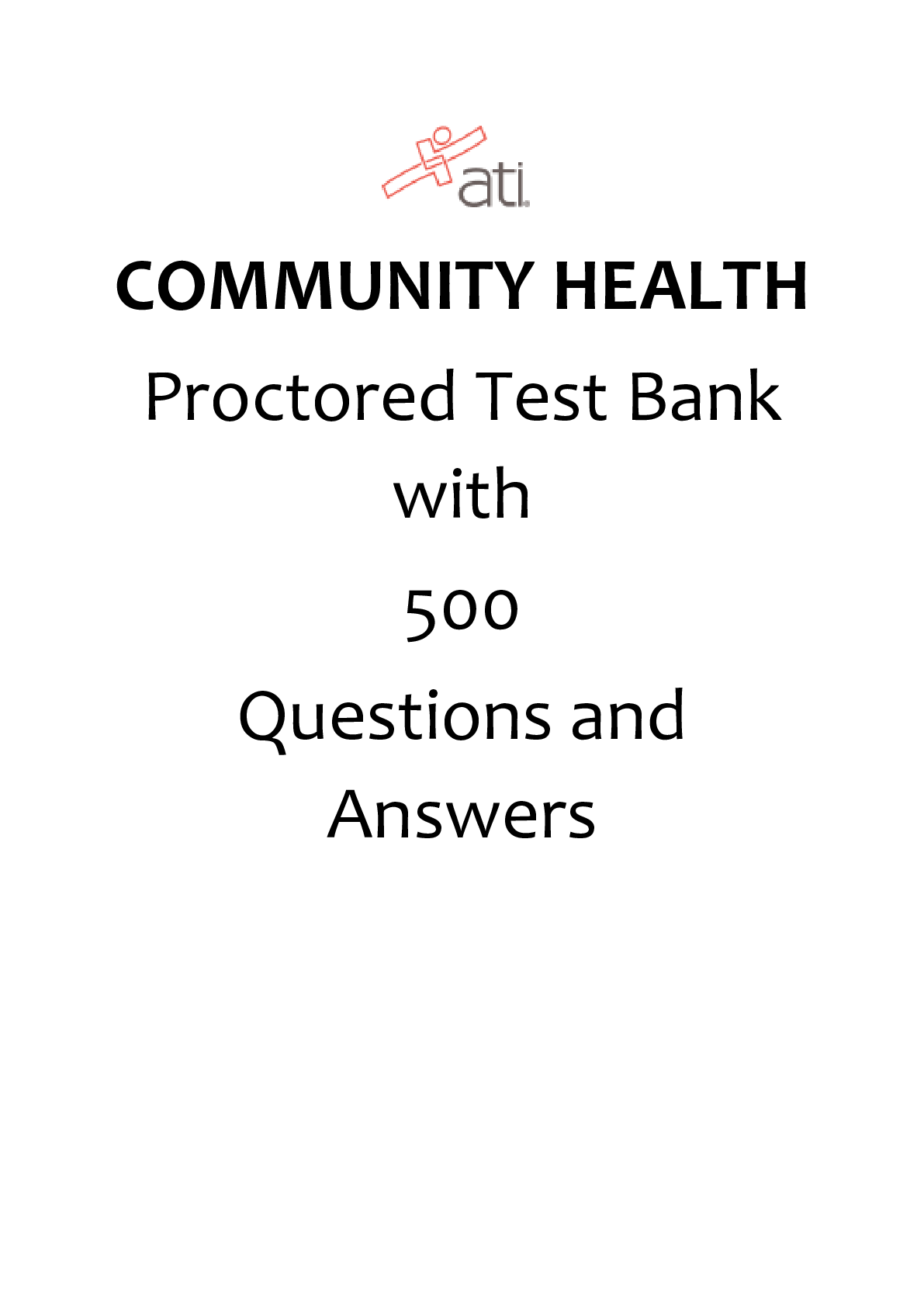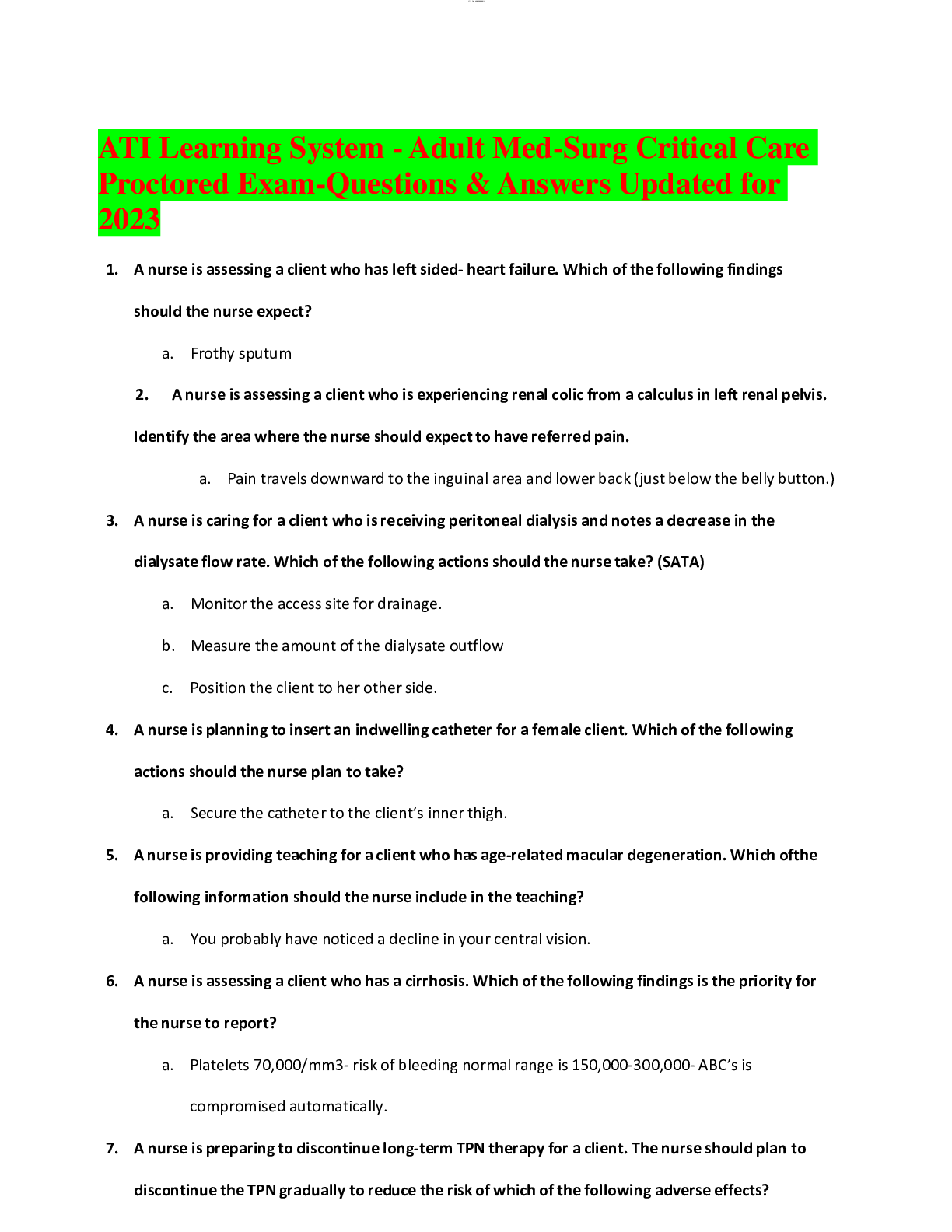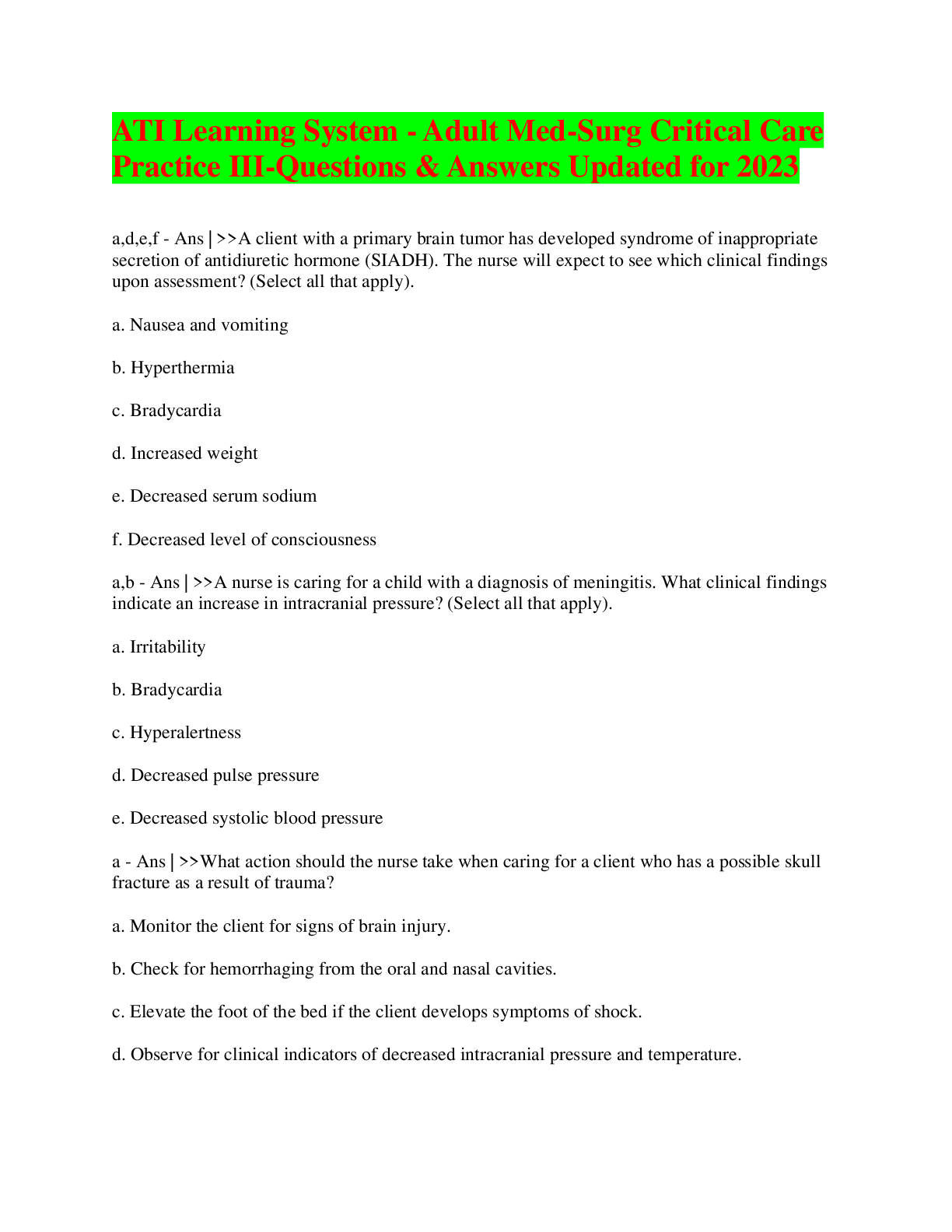*NURSING > ATI > SOLVED-ELABORATED-ATI MENTAL HEALTH Proctored Test Bank with 1000+ Questions and Rationalized Answer (All)
SOLVED-ELABORATED-ATI MENTAL HEALTH Proctored Test Bank with 1000+ Questions and Rationalized Answers 2018 to 2021
Document Content and Description Below
1) A nurse is teaching a client who has schizophrenia about her new prescription for risperidone. Which of the following statements should the nurse include in the teaching? a. "You should continue th... is medication if you develop muscle rigidity". b. "You will experience weight loss while taking this medication." C. "You will notice your symptoms improve within 24 hours of taking this medication." d. "You should increase your consumption of complex carbohydrates." 2) A nurse is admitting a client who has generalized anxiety disorder. Which of the following actions should the nurse plan to take first? a. Provide the client with a quiet environment b. Determine how the client handles stress. c. Teach the client to use guided imagery. d. Ask the client to identify her strengths 3) A nurse is conducting an admission interview with a client who is experiencing mania. Which of the following should the nurse report to the provider? a. States that he hasn't bathed in 2 days b. Reports eating twice in the past two weeks. C. Makes inappropriate sexual comments. d. Speaks in rhyming sentences. 4) A nurse is planning care for a client who has obsessive-compulsive disorder. Which of the following recommendation should the nurse include in the clients plan of care? a. Validation therapy b. Thought stopping c. Operant conditioning d. Reality orientation therapy 5. A nurse is caring for a client who has bipolar disorder and is experiencing a manic episode. Which of the following actions should the nurse take? a. Encourage the client to join group activities b. Dim the lights in the clients room c. Provide detailed explanations to the client d. Administer methylphenidate 6) A nurse is leading a crisis intervention group for adolescents who witnessed the suicide of a classmate. Which of the following actions should the nurse take first. a. Initiate referrals b. Review community resources c. Identify prior coping skills d. Discuss the importance of confidentiality 7) A nurse overhears a client saying, "I am a spy, a spy for the FBI. I am an I, an eye for an eye in the sky. Sky is up high." The nurse should document the client's statement as urse is planning care for a client who has borderline personality disorder who self- mutilates. Which of the following test approaches should the nurse plan to take? a. Restrict participation in group therapy sessions. The nurse should encourage the client who has borderline personality disorder to participate in group therapy sessions to encourage appropriate interaction with other clients. b. Establish consequences for self-mutilation. The nurse should respond to self-mutilation with a neutral affect and encourage the client to write down feelings that occurred leading up to the incident. c. Maintain close observation of the client. Clients who have borderline personality disorder are at risk for self-harm during times of increased anxiety. Maintaining close observation reduces the client's risk of injury. d. Provide an unstructured environment. Providing an unstructured environment for a client who has borderline personality disorder is not an effective treatment approach because it does not provide a safe environment to protect the client from impulsive and self-injurious behavior. 2. A nurse is assessing a client who has Stage 4 Alzheimer's disease. Which of the following findings should the nurse expect? a. The client requires assistance with eating. The nurse should expect the client who has Stage 4 Alzheimer’s disease to still have the ability to eat without assistance. Clients who have Alzheimer’s disease maintain this ability until Stage 7. b. The client independently manages personal finances. The nurse should expect the client who has Stage 4 Alzheimer’s disease to have difficulty performing complex tasks, such as managing personal finances. c. The client has bladder incontinence. The nurse should expect the client who has Stage 4 Alzheimer’s disease to be able to use the toilet independently. Clients who have Alzheimer’s disease maintain continence until Stage 6. d. The client is able to identify the names of family members. The nurse should expect the client who has Stage 4 Alzheimer’s disease to recognize and identify family members. Clients who have Alzheimer’s disease maintain this ability until Stage 6. 3. A nurse is caring for a client who reports that the television set in the room is really a two-way radio and states, "voices are coming from the TV and everything we say in the room is being recorded." Which of the following responses should the nurse make? a. "What we say is not being recorded." The nurse should avoid negating the client’s beliefs about the delusion. This response can promote a defensive client response and interfere with the development of trust in Prof.Exams the nurse-client relationship. b. "Let's ignore the voices and talk about something else." The nurse should ask the client directly about what the voices are saying to determine if there is a safety risk. The nurse should also avoid validating that the voices are real, which promotes the client’s beliefs about the delusion. c. "That must be very frightening." The nurse should respond to the client’s delusion in a calm and empathetic manner. By acknowledging to the client that the delusion must be frightening, the nurse promotes the nurse-client relationship. d. "Why do you think the TV is a two-way radio?" The nurse should avoid asking the client a "why" question, which promotes a defensive client response. 4. A nurse is planning care for a newly admitted client who has bipolar disorder and is experiencing acute mania. Which of the following client goals should the nurse identify as the priority? a. Practicing problem-solving skills The nurse should encourage the client to practice problem-solving skills during the continuation phase of treatment; however, there is another intervention that is the priority during the acute phase of bipolar disorder. b. Understanding of medication regimen The nurse should ensure that the client understands the medication regimen during the continuation phase of treatment; however, there is another intervention that is the priority during the acute phase of bipolar disorder. c. Identifying indications of relapse The nurse should teach the client to recognize indications of relapse during the 30. A nurse in a substance abuse treatment facility is reviewing the medication records for a group of clients. The nurse should expect to administer Methadone for a client who has a substance use disorder for which of the following addictions? a. Amphetamines The nurse should recognize that the administration of methadone is not indicated for the treatment of amphetamine use disorder. b. Opiates The nurse should recognize that the administration of methadone is indicated for the treatment of opiate use disorder. Opiates include opium, morphine, codeine, methadone, and heroin. Methadone is given as a substitute to prevent cravings and severe manifestations of opiate withdrawal. c. Barbiturates The nurse should recognize that the administration of methadone is not indicated for the treatment of barbiturate use disorder. d. Hallucinogenics The nurse should recognize that the administration of methadone is not indicated for the treatment of hallucinogen use disorder. 31. A nurse is caring for a client who has just received a terminal diagnosis of cancer. Which of the following initial reactions should the nurse expect? Prof.Exams a. Bargaining The nurse should expect the client to exhibit bargaining during the grief process; however, there is another response that is expected first. b. Depression The nurse should expect the client to exhibit depression during the grief process; however, there is another response that is expected first. c. Denial The nurse should expect the client to initially deny the reality of the diagnosis. This is a protective reaction that serves to protect the client from psychological pain. d. Anger The nurse should expect the client to exhibit anger during the grief process; however, there is another response that is expected first. 32. A nurse is caring for a client with Alzheimer Disease and becomes agitated while refusing morning hygiene care. Which of the following actions should the nurse take? a. Talk to the client from two arm-lengths away. The nurse should talk calmly and quietly to the client to decrease her agitation. The nurse should remain one to two arm-lengths away to provide her with a sense of personal space and maintain safety if she becomes aggressive. b. Obtain assistance to restrain the client for safety. The nurse should identify that the client’s refusal of care is not a justification for restraints. The nurse should apply restraints only if her behavior becomes a threat to her safety or the safety of others. c. Firmly state to the client that morning care will be performed. The nurse should recognize that the client has a right to refuse care. Telling her that care will be performed, despite refusal, can increase her anxiety and agitation. d. Call the provider to request a prescription for an antipsychotic medication. The nurse should recognize that antipsychotic medications are used only with extreme1. A nurse is caring for a school-aged child who has conduct disorder and is being physically aggressive toward other children in the unit. Which of the following actions should the nurse take first? a. Place the child in seclusion b. Use therapeutic hold technique c. Apply wrist restraints d. Administer risperidone 2. A nurse is caring for a client who has a new diagnosis of bulimia nervosa. Which of the following diagnosis procedures should the nurse anticipate the provider should describe during the medical evaluation? a. Chest x-ray b. ECG c. Coagulation studies d. Liver function test 3.A nurse is caring for a client who exhibits excessive compliance, passivity, and self- denial. The nurse should recognize that these findings are associated with which of the following personality disorders? a. Dependent Prof.Exams b. Paranoid c. Borderline d. Histrionic 4. A nurse is caring for a client who is involuntarily admitted for major depressive disorder and refuses to take prescribed antianxiety medication. Which of the following actions should the nurse take? a. Inform the client that he does not have the right to refuse medication b. Administer the medication to the client via IM injection c. Offer the client the medication at the next scheduled dose time d. Implement consequences until the client take the medication 5. A nurse is caring for a client in the emergency department who states she was beaten and sexually assault by her partner. After a rapid assessment, which of the following actions should the nurse plan to take next? a. Conduct a pregnancy test b. Requests mental health consultation for the client c. Provide a trained advocate to stay with the client d. Offer prophylactic medication to prevent STI’s 6. A nurse is caring for a client who has major depressive disorder. After discussing the treatment with his partner, the client verbally agrees to electroconvulsive therapy (ECT) but will not sign the consent form. Which of the following actions should the nurse take? a. Request that the client’s partner sign the consent form b. Cancel the scheduled ECT procedure c. Proceed with the preparation for ECT based on implied consent d. Inform the client about the risks of refusing the ECT 7. A nurse is caring for a client who reports that he is angry with his partner because she thinks he is just trying to gain attention. When the nurse attempts to talk to the client, he becomes angry and tells her to leave. Which of the following defense mechanisms is the client demonstrating? 1. A nurse is reviewing the medication administration record of a client who has major depressive disorder and a new prescription for selegiline. The nurse should recognize that which of the following client medications is contraindicated when taken with selegiline? a. Wafarin b. Fluoxetine C.Calcium carbonate d. Acetaminophen 2. A nurse in a long-term care facility is assessing a client who has dementia. Which of the following findings should the nurse identify as a risk for this client? a. Outside doors have locks b. The bed is in the low position c. Hallways are long distances d. The room has an area rug 3.A nurse is providing behavioral therapy for a client who has obsessive-compulsive disorder. The client repeatedly checks that the doors are locked at night. Which of the following instructions should the nurse give the client when using thought stopping technique? a. “Ask a family member to check the locks for you at night” b. “Keep a journal of how often you check the locks each night” c. “Snap a rubber band on your wrist when you think about checking the locks” d. “Focus on abdominal breathing whenever you go to check the locks” 4. A nurse in an inpatient mental health facility is assessing a client who has schizophrenia and is taking haloperidol. Which of the following clinical findings is the nurse’s priority? a. Insomnia b. Urinary hesitancy c. Headache d. High fever 5. A nurse is caring for a client who has Alzheimer’s disease. Which of the following findings should the nurse expect? a. Failure to recognize familiar objects b. Altered level of consciousness c. Excessive motor activity d. Rapid mood swings 6. A nurse in a mental health facility is interviewing a new client. Which of the following outcomes must occur if the nurse is to establish a therapeutic nurse-client relationship? a. The nurse is seen as an authority figure Prof.Exams b. A written contract is established to clarify the steps of the treatment plan c. The nurse maintains confidentiality unless the client’s safety is compromised d. The nurse is seen as a friend 7. A nurse is teaching a client who has a new prescription for disulfiram. Which of the following statements by the client indicates an understanding of the teaching? a. “If I cut myself, I can clean the wound with isopropyl alcohol” b. “I can wear my cologne on special occasions” c. “When I bake my favorite cookies, I can use pure vanilla extract for flavoring” d. “I can continue to eat aged cheese and chocolate” 8. A nurse is planning care for a client who has narcissistic personality disorder. Which of the following actions is appropriate for the nurse to include in the plan of care? a. Ask the client to sign a no-suicide contract b. Remain neutral when communicating with the client c. Request an antipsychotic medication from the provider d. Provide the client with high-calorie finger foods 9. A nurse is reviewing the laboratory report of a client who is taking carbamazepine for bipolar disorder. Which of the following laboratory results should the nurse report to the provider? a. Urine specific gravity 1.029 b. Platelets 90,000/mm3 c. Urine pH 5.6 d. RBC 4.7/mm3 10. A nurse is providing teaching about relapse prevention to a client who has schizophrenia. Which of the following statements by the client indicates an understanding of the teaching? a. “I should avoid being around others if I think I’m having a relapse” b. “I should let my counselor know if I am having trouble sleeping” c. “I shouldn’t worry about the voices because they are a part of my illness” a. Rationalization [Show More]
Last updated: 2 years ago
Preview 1 out of 272 pages

Buy this document to get the full access instantly
Instant Download Access after purchase
Buy NowInstant download
We Accept:

Reviews( 0 )
$20.00
Can't find what you want? Try our AI powered Search
Document information
Connected school, study & course
About the document
Uploaded On
Feb 23, 2023
Number of pages
272
Written in
Additional information
This document has been written for:
Uploaded
Feb 23, 2023
Downloads
0
Views
126


.png)



